
views
Changing Your Baby’s Eating Habits

Feed your baby smaller but more frequent meals. Your baby will generally let you know when they’re hungry by smacking their lips, making sucking sounds, or getting fussy. Try feeding them half the amount of formula or breastmilk you normally would, waiting 15 minutes, and then giving them the other half. This could help their digestion hurt less.Did You Know? Most babies under 4 months need to nurse or eat at least 8-12 times per day.

Keep your baby as upright as possible to help their digestion. After feedings, prop your baby upright on your shoulder for about half an hour to help their stomach digest the formula or milk. Wait at least half an hour after they eat to lay them down on their back. This should prevent your baby from spitting up the milk they’ve just eaten.
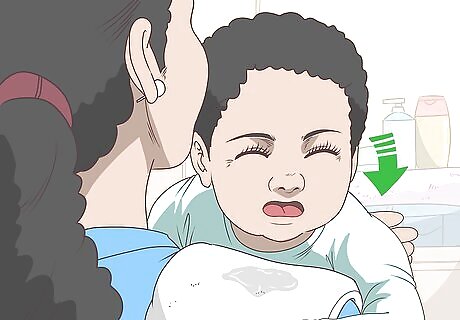
Burp your baby frequently to allow air to escape. Try burping every 2-3 oz (59.14-88.72 mL) if you’re using formula, or each time you switch breasts if you’re nursing. Hold your baby upright on your shoulder and pat them gently on the back until you hear them burp. Your baby may spit up when you burp them. Keep a rag nearby in case that happens.
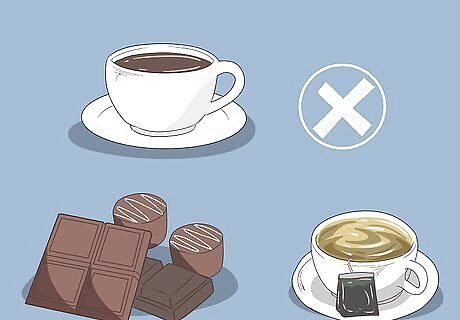
Eliminate caffeinated foods and drinks if you’re breastfeeding. Chocolate, coffee, and caffeinated tea all act as stimulants and can be passed on to your baby through breastmilk. Try not to eat these foods if you are still breastfeeding so your baby’s sleep cycle doesn’t get disrupted. Herbal teas are almost all caffeine-free if you need a replacement.
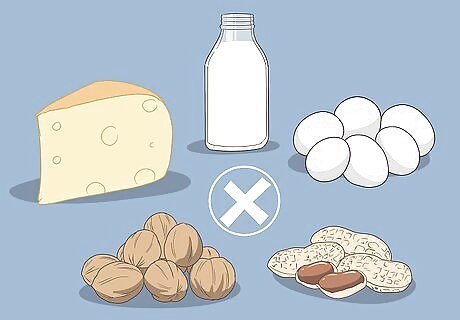
Avoid eating dairy products and nuts if you are breastfeeding. Since your baby is so young, it’s hard to tell what they are allergic to. Dairy products and nuts are the 2 most common allergens, and your baby could be allergic to them. Try cutting these out of your diet for about 2 weeks to see if it calms you baby down. Check with your doctor before you make changes to your diet to ensure you’re still getting enough essential nutrients from what you eat.
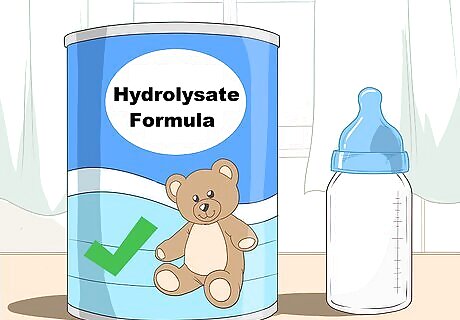
Switch to a hydrolysate formula if your baby has milk intolerance. Hydrolysate formula contains already-broken-down milk proteins, which should help your baby’s digestion. If an allergy is causing your baby’s colic, you’ll notice improvement 2 days after changing formulas. Check with your doctor before you make this switch. You can also try a soy-based formula, but this may also cause allergies in your baby. Follow your doctor’s recommendations for which products you should try.
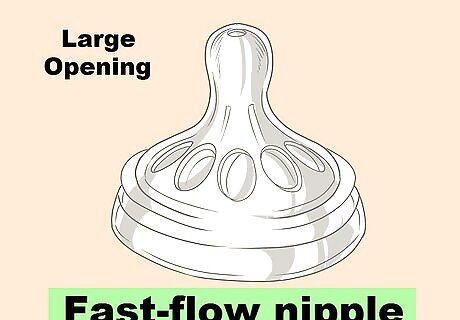
Use a fast-flow nipple if you’re bottle-feeding. If babies struggle to get milk through nipples with small openings, they may suck too much air into their bellies along with their food. Nipples with larger openings should allow your baby to suck gently and evenly.
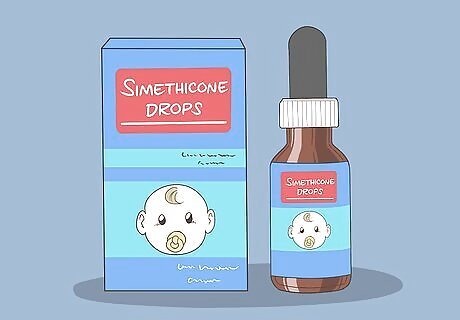
Try simethicone drops if your baby has an upset stomach. Simethicone drops are available over the counter and help to relieve painful gas and digestion in infants. Use a 20 mg dose up to 4 times a day when your baby becomes fussy after feeding times. Make sure the drops you buy are marketed toward infants so they don’t contain harmful chemicals.
Comforting Your Baby

Swaddle your baby to help them feel secure. Lay out a square blanket and fold the top corner down, then place your baby on top of it with their head at the folded corner. Keep your baby’s arms at their sides and then fold the sides of the blanket over their body, tucking in their arms. This could help your baby avoid overstimulation, which may be the source of their colic. Being swaddled is very soothing for babies and may help them fall asleep.

Give your baby a warm bath to calm and soothe them. Fill a small tub with 2 to 3 inches (5.1 to 7.6 cm) of warm water. Use a washcloth to gently sponge your baby with the warm water all over their body for 10 to 15 minutes. Try keeping them upright in the bath to help their digestion at the same time. The warmth from a bath could ease any digestive discomfort your baby is experiencing. Don’t give your baby a full bath until after their umbilical cord falls off, which is usually about 2 to 3 weeks after birth. Until then, limit them to sponge baths.

Cuddle your baby to build their trust in you. Your baby’s constant crying could be happening for any number of reasons. Let your baby know that you’re there for them by keeping them close to your body. They’ll respond positively to the feel of your body heat, heartbeat, and the sound of your voice.Tip: Try wearing an infant carrier that secures around your body to give your arms a break.

Massage your baby’s belly to help their digestion. Place your baby tummy-side-up on your lap. Imagine an upside-down U on your baby’s abdomen, and use baby-safe massage oil to very gently rub your baby’s belly in clockwise, circular motions along the line of the imaginary U. You can also try simply pressing your hand with very low pressure into your baby’s tense belly as you lean them forward from your lap. Wait at least half an hour before massaging your baby's belly so that it doesn't upset their stomach.
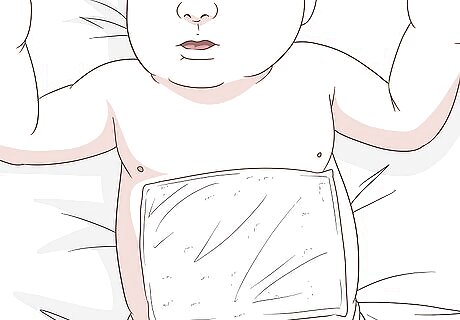
Put a warm washcloth on your baby’s belly to soothe them. Run a washcloth under lukewarm water from your sink and wring out the excess. Place the rag on your baby’s bare belly to simulate the feeling of warmth and comfort they had in the womb. Keep the rag on their stomach until it starts to cool down, then take it off. Make sure you don’t use hot water, which could burn your baby’s delicate skin.
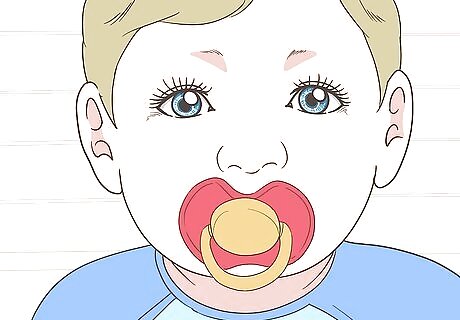
Offer your baby a pacifier to calm them down. Some babies appreciate having something to suck on when they aren’t eating. Try putting the tip of a clean pacifier in your baby’s mouth to see if they latch on. If they don’t, take the pacifier away and try it again later. If your baby is hungry, sucking on a pacifier might make them angry since they are expecting food.
Soothing Your Baby with Motion and Sounds
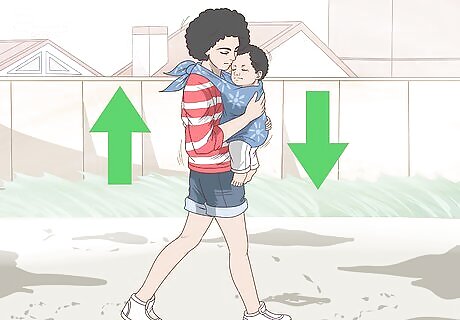
Walk around while you hold your baby upright. The combination of gentle motion from your walking and the baby’s upright position should help them digest and release painful gas. You can also try gently rocking or bouncing your baby as you walk. Hold your baby tightly to comfort them with a hug while you walk. You can also try walking around with your baby around the block or through a park for some fresh air. Put your baby in a stroller on long walks to give your arms a break.

Drive your baby around in your car. Driving slowly with your baby in the car may provide them with the precise motion they need to calm down and relax. Be careful not to overuse this method, however, as it can quickly become a waste of gas.Warning: Avoid driving when you’re overtired. This will only put you and your baby in danger.

Play soft and calming music or sounds for your baby. Some babies may need background noise to avoid overstimulation. Try using instrumental music, heartbeat sounds, or nature noises to soothe your baby and keep them quiet. Try not to turn the music or sounds up too loud, or you could overstimulate your baby.

Introduce white noise with a fan, dryer, or vacuum. Music may be too much for some babies, and you may get tired of hearing the same songs over and over again. Household products can provide you with alternatives, although you may need help to run the vacuum while holding your baby. White noise can also give you a break from the noise of your baby’s crying.

Eliminate all stimuli if your baby doesn’t calm down with noise. If music or white noise doesn't comfort your little one, they could be craving silence. Snuggle your baby and sit in a dark, quiet room like their nursery or your own bedroom to see if they calm down.
When to Seek Medical Care

Check with your doctor before trying natural or homeopathic remedies. Caring for a baby that won’t stop crying is really difficult, so you likely want to try any treatment that might help. However, some remedies aren’t safe or may not be effective. Talk to your doctor about the benefits and risks of the treatments you want to try. Then, ask them if these treatments are safe for your baby. For instance, gripe water is a home remedy that's been around for years. While some people swear by it, there's no actual evidence that it works. Keep in mind that homeopathic remedies typically aren’t scientifically tested, so there’s no proof that they work.

Take your baby to the doctor if they may be injured or ill. In most cases, colic isn’t a sign of a medical condition. However, babies also cry when they’re hurt or sick. If you suspect your baby’s crying might be caused by an ailment, take them in for a checkup to make sure they’re okay.Warning: Your baby may be sick if they have a fever over 100.4 °F (38.0 °C), they are vomiting, they have diarrhea, or they can’t sleep.
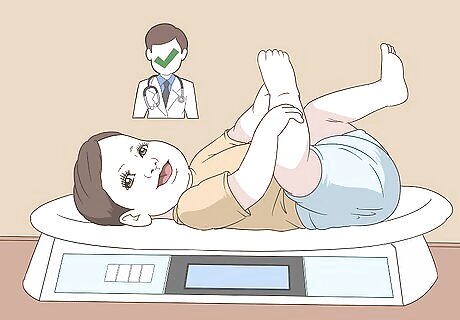
Call your doctor if your baby is having trouble gaining weight. Colic shouldn’t cause any health concerns for your baby, including poor weight gain. If your baby is having trouble getting milk or is not gaining weight, there may be something else wrong. Try not to worry because your doctor can help. Tell them about your concerns so you can help your baby gain weight. You may be able to work with a lactation specialist if you’re breastfeeding your baby. Otherwise, your doctor might recommend another type of nipple for the baby's bottle if you're feeding them formula.

See your doctor or a therapist if you’re struggling to cope. It’s very stressful to care for a baby who has colic, and it’s totally normal to feel upset, frustrated, and sad. You may need extra support while your baby goes through this phase. Talk to your doctor about your options or get a referral to a therapist, who can help you cope. It’s common for parents of colicky babies to feel depressed, exhausted, and helpless. These feelings can be really hard to deal with on your own, so don’t hesitate to ask for help. Things will get better.



















Comments
0 comment